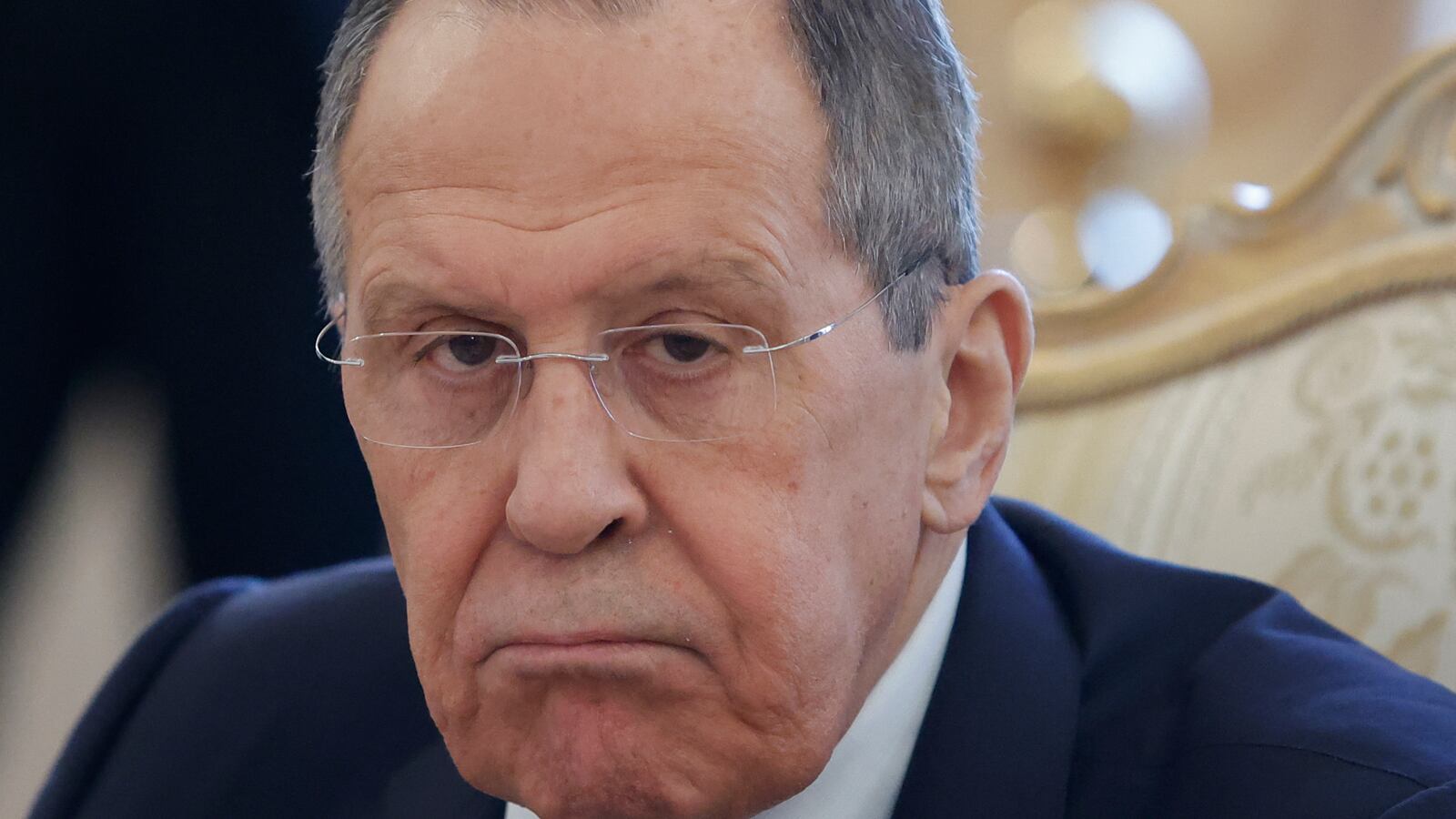Russia says a deal with Ukraine is looking more likely after the Ukrainian president said the country will likely not be admitted to NATO.
Three weeks into Moscow’s brutal all-out war against Ukraine—and as Russian troops continue to target civilians and bomb Ukrainian cities—sources cited by the Financial Times on Wednesday said a tentative 15-point peace plan is under discussion by Ukraine and Russia that would see Kyiv give up its ambitions to join the Western alliance.
The deal would also require Ukraine to refrain from hosting any foreign military bases as part of a vow to remain “neutral.”
It was not clear what sort of terms the agreement would lay out for territories of Ukraine seized by Moscow and its separatist fighters back in 2014, as Kyiv has for years refused to recognize their independence.
Mykhailo Podolyak, a top adviser to the Ukrainian president, told the FT the deal would call for “the troops of the Russian Federation in any case leaving the territory of Ukraine” seized since the invasion began three weeks ago.
He later clarified on Twitter that the FT report represented only the “requesting position of the Russian side” and “nothing more.”
News of Russia’s proposals broke shortly after Russian Foreign Minister Sergei Lavrov said the Kremlin was more optimistic about striking a deal with Ukrainian leaders now that they have demonstrated “some changes in rhetoric.”
His comments came after Volodymyr Zelensky publicly cast doubt on the country’s prospects for joining NATO (and the same morning the Ukrainian president addressed the U.S. Congress).
“For years we have been hearing about how the door is supposedly open [to NATO membership] but now we hear that we cannot enter. And it is true, and it must be acknowledged,” Zelensky said during an address Tuesday.
His remarks were interpreted by some as a concession to Moscow, which has long demanded that Kyiv give up any ambitions to join the alliance, a move which it claims poses a direct threat to all of Russia. Putin used Ukraine’s refusal to rule out joining the alliance as a pretext to launch the war that has decimated Ukrainian cities and already killed tens of thousands of civilians.
“Some changes in the rhetoric [of Ukrainian leaders] about a more realistic perception of what is happening are encouraging,” Lavrov said in an interview with RBC on Tuesday, adding that there is a “chance” for peace.
He cited Zelensky’s remarks about NATO specifically as a sign that “cool-headedness is making its way through.”
In the same interview, he went on to claim, against all evidence, that Russia has nothing against the Ukrainian people its forces have spent the past 21 days relentlessly bombing.
“We have never had any grievances against the Ukrainian people.… I am sure that the vast majority of our citizens have no problems or grievances against the Ukrainian people, just as the Ukrainian people have never had any grievances against Russia,” he said, adding that, “I personally have many Ukrainian friends.”
The Kremlin also floated the idea of Ukraine becoming a neutral country with its own army, with spokesman Dmitry Peskov saying that “could be viewed as a certain kind of compromise.”
Zelensky, meanwhile, said Russia’s stance in negotiations had become “more realistic” as the two sides prepare to resume talks.
“Efforts are still needed, we still have to fight and work—everyone in their place,” he said in a video address, adding that “meetings continue.”
Oleksiy Arestovich, an adviser to the Ukrainian president, went even further and predicted the war could be over by May.
“I think that no later than in May, early May, we should have a peace agreement, maybe much earlier, we will see, I am talking about the latest possible dates,” he said in a Tuesday video statement.
“We are at a fork in the road now. There will either be a peace deal struck very quickly, within a week or two, with troop withdrawal and everything, or there will be an attempt to scrape together some, say, Syrians for a round two and, when we grind them too, an agreement by mid-April or late April,” he said.
Despite the relatively optimistic assessments, however, there were still plenty of signs the war was far from over. Hours before the Kremlin dangled a chance for compromise, Putin claimed Ukrainian leaders weren’t “showing a serious attitude” about reaching a deal.
And Russian forces seemed to be intensifying attacks on Ukrainians.
A shell hit a 12-story apartment building in Kyiv on Wednesday, leaving several injured. In Mariupol, Russian forces struck a theater where hundreds of civilians were sheltering. The number of casualties was not immediately clear.
Ukrainian Deputy Prime Minister Iryna Vereschchuk said Russian forces were also derailing evacuation efforts and ignoring cease-fire agreements, targeting civilians directly.
“Occupiers began to fire on columns of buses, fire on residential areas and points where people gathered for evacuation,” she said in a video statement Wednesday, noting that Russian troops are also unleashing artillery fire from inside a hospital they seized along with hostages in Mariupol.
U.S. Secretary of State Antony Blinken also appeared to caution against optimism in an interview with NPR published Wednesday.
While he said U.S. sanctions that have devastated Russia’s economy are “not designed to be permanent” and could “go away” if Russia halted its aggression, he stressed that the Biden administration would not be satisfied with a troop withdrawal alone. Any such pullout would have to be “irreversible,” he said, with assurances made that “this can’t happen again, that Russia won’t pick up and do exactly what it’s doing in a year or two years or three years.”
“We’ve seen the brutality that Vladimir Putin has brought to this. We know his track record in Chechnya. We know the track record of what he’s aided and abetted in Syria. I think we have to expect the same,” he said.








